
|
Nov 18, 2019 | Issue 236 NEWSLETTER |

|
|
Dhaka global dialogue: Rohingyas are a threat to regional security: HPM The pace and magnitude of “terrorist attacks” in Bangladesh continued to decline in 2018, thanks to a raft of measures put in place by the government, says a US report. The Country Reports on Terrorism 2018 released by the US Department of State said Bangladeshi security forces continued a counterterrorism campaign that claimed to have disrupted planned attacks, captured suspected militant leaders, and seized caches of weapons, ammunition, and explosives. The report said Bangladesh cooperated with the United States in strengthening control of its borders and ports of entry. |
|
Bangabandhu envisioned postcolonial identity, says Shashi Tharoor 
The long-awaited panel discussion on “Sheikh Mujib: Icon of Postcolonial Liberation”, which featured Indian writer, diplomat and politician Shashi Tharoor, was held on the second day of the three-day long Dhaka Lit Fest (DLF). He spoke about Bangabandhu Sheikh Mujibur Rahman’s uncanny articulation and oratory skills, recalling a 1972 event where Mujib spoke during a stopover in Kolkata. He went through all that before reaching the ultimate goal. He articulated a vision of what that form of postcolonial identity meant, which I think has rightly continued to inspire many, said the author-politician. |
|
HPM Sheikh Hasina pledges to provide electricity to every household by 2021 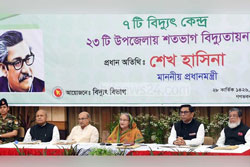
HPM Sheikh Hasina has promised to provide electricity to every household in Bangladesh while urging citizens not to waste power. The prime minister launched seven power stations and 100% electricity coverage in 23 upazilas through a video conference. The seven power plants are -- Anowara 300MW Power Plant, Rangpur 113MW Power Plant, Karnaphuli 110MW Power Plant, Shitalbaha 105MW Power Plant, Patiya 54MW Power Plant, Tetulia 8MW Solar Power Plant and Gazipur 100MW Power Plant. Over the span of a decade, under the government, led by HPM Sheikh Hasina, 94 percent people have been brought under electricity coverage as the total power generation now stands at 22,562 MW. |
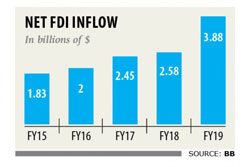
Bangladesh received a record $3.61 billion last year as Foreign Direct Investment (FDI), up by 67.94% more than in 2017, thanks to various steps the government has taken to attract new investments. While China became the leading investor in the country with $1.03 billion, the United States, traditionally the top investor, dropped to fourth with only $174 million in FDI for 2018 in Bangladesh. The power sector alone had attracted investments worth $1.01 billion, where China contributed $834 million, followed by $730 million in the food sector, and $430 million in the textile sector. |
|
Bangladesh parliament passes ‘planetary emergency’ motion for quick climate steps 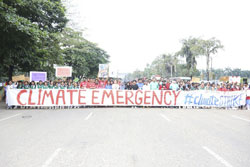
Parliament has passed a motion declaring a “planetary emergency” and calling for quick action by the international community, including the United Nations, to tackle the effects of climate change. Bangladesh raised a $38 billion fund on its own to tackle the adverse effects of climate change and took 718 projects with the fund, according to media reports. The global community must act urgently, decisively and with considerably higher ambition in achieving net zero carbon emissions well before 2050, capping temperature rise to 1.5 degree Celsius and transitioning swiftly to low carbon economies as overarching priorities. |
|
Bangladesh to support development projects in Nepal 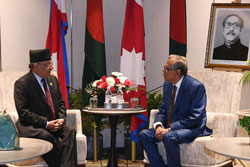
Bangladesh will offer its full support to Nepal in achieving its development goals, Honourable President Abdul Hamid has said. The head of state, who is currently on a four-day official visit to Nepal, gave the assurance during a meeting with Nepal's former prime minister and Communist Party Co-Chairman Pushpa Kamal Dahal in Kathmandu on Wednesday. Pledging support to the Himalayan country's vision of a “Samriddha Nepal, Sukhi Nepali” (‘Prosperous Nepal, Happy Nepali’), he pointed to Bangladesh's own development goals under Vision 2021 and 2041 and noted that the two countries can benefit from mutual cooperation. |
|
India opens more waterway routes with Bangladesh 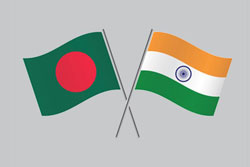
India is opening more inland waterway routes for container movement under an updated inland water transit and trade protocol with Bangladesh to bolster cross-border coastal trade over the Bay of Bengal. The recent sailing of the MV Maheshwari this week from Haldia Dock near Kolkata in the state of West Bengal to Pandu via Padma, a river terminal near Guwahati in the state of Assam, is the latest effort on that front. The India-Bangladesh territorial waters through the Ganges and Brahmaputra rivers cover 1,425-kilometre (885 mile) distance taking an estimated 15-day transit. |
|
BANGLADESH AWAMI LEAGUE |




|